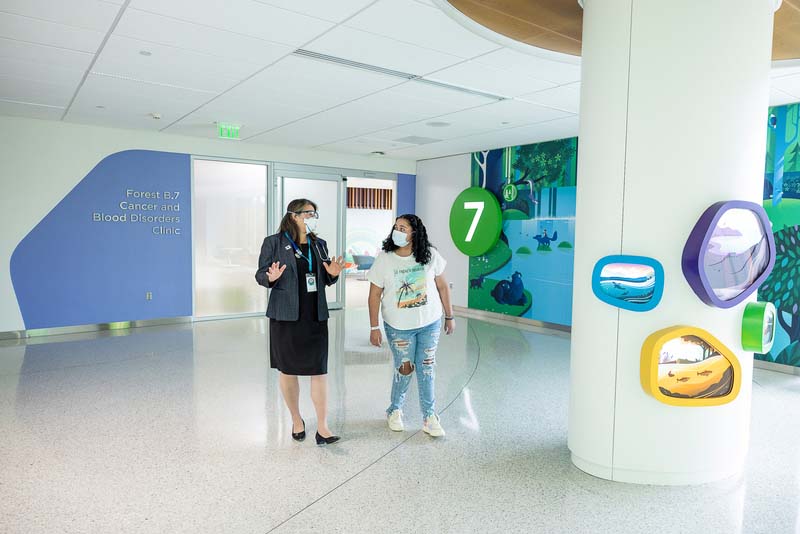Seattle Children’s Researchers Present Findings at American Society of Hematology Annual Meeting
Online publication date: Dec. 6, 2022
Seattle Children’s cancer and blood disorder research will be well represented at the American Society of Hematology (ASH) 64th annual meeting from Dec. 10 to 13 in New Orleans, Louisiana.
Many oral and poster abstracts were submitted by Seattle Children’s researchers for the event, which demonstrate the depth and breadth of research at Children’s — internationally recognized for breakthroughs in pediatric cancer and blood disorders.
“We continue to make exciting progress to improve the outcomes of children and teens with cancer and blood disorders,” said Dr. Mignon Loh, director of the research institute’s Ben Towne Center for Childhood Cancer Research, chief of the Division of Pediatric Hematology, Oncology, Bone Marrow Transplant and Cellular Therapy, and a professor of pediatrics at the University of Washington School of Medicine.
 Loh is associated with more than a dozen presentations at this year’s conference. “Our investigators span the Seattle Children’s Research Institute and the Fred Hutchinson Cancer Center and work tirelessly to understand the mechanisms that underpin these aggressive diseases with the goal of bringing innovative clinical trials to our patients in the Pacific Northwest and beyond,” she said.
Loh is associated with more than a dozen presentations at this year’s conference. “Our investigators span the Seattle Children’s Research Institute and the Fred Hutchinson Cancer Center and work tirelessly to understand the mechanisms that underpin these aggressive diseases with the goal of bringing innovative clinical trials to our patients in the Pacific Northwest and beyond,” she said.
Among the presented findings:
Oral Abstract #375: An analysis of the association of pre-transplant conserved transcriptional response to adversity profile with psychosocial patient-reported outcomes in allogeneic hematopoietic cell transplant (HCT) recipients, highlighting the importance of social well-being and community context in the setting of allogeneic HCT (Dr. Molly Taylor, Biobehavioral Oncology Research Program, Ben Towne Center for Childhood Cancer Research, Seattle Children's Research Institute, and acting assistant professor, Department of Pediatrics, University of Washington School of Medicine).
Poster Abstract #3584: An exploration of COVID-19 infection in children with Down syndrome (DS) who also have hematologic malignancies. Results found that while the medium age at infection was similar in children with or without DS and few children had relapsed disease, children with DS were more likely to be hospitalized, admitted to the ICU and more often required respiratory ventilation or other vasopressor support (Dr. Jennifer Wilkes, attending physician, Pediatric Hematology/Oncology, Seattle Children’s; Ben Towne Center for Childhood Cancer Research, Seattle Children’s Research Institute).
Poster Abstract #2801: Findings from the largest study of rare TP53 mutations in pediatric patients with acute myeloid leukemia and its prognostic significance (Dr. Adam Lamble, attending physician, Cancer and Blood Disorders Center, Seattle Children’s; Ben Towne Center for Childhood Cancer Research, Seattle Children’s Research Institute; assistant professor, Department of Pediatrics, University of Washington School of Medicine).
Poster Abstract #2762: New data from the phase 1 study examining the safety and activity of the CD123xCD3 bispecific antibody flotetuzumab (MacroGenics) in children and AYAs with relapsed or refractory acute myeloid leukemia (Lamble).
Poster Abstract #1471: Report from the Children’s Oncology Group which explores the retrospective impact of an updated risk classification on treatment allocation for patients with high-risk AML (Lamble).
Poster Abstract #2718: An overview of the phase 1 study of Tagraxofusp, with or without chemotherapy, in children and AYAs with relapsed or refractory CD123-expressing hematologic malignancies (Lamble).
Poster Abstract #3638: For many patients suffering from acute myeloid leukemia (AML), hematopoietic stem cell transplantation (HSCT) remains the best treatment option, but global health inequities continue to serve as barrier to access. This study confirms that allogeneic HSCT for AML is rising globally but there are marked variations in utilization rates and practices around the world (Dr. Lisa Force, pediatric hematologist/oncologist, Seattle Children’s).
Oral Abstract #436: Subtype-dependent drug resistance alterations in relapsed childhood B-cell acute lymphoblastic leukemia: A Children’s Oncology Group study (Dr. Mignon Loh).
Oral Abstract #411: Rare deleterious TCF3 germline variants and predisposition to acute lymphoblastic leukemia in children (Loh).
Oral Abstract #901: The impact of cumulative anesthesia exposure on neurocognitive outcomes in children with high-risk precursor B acute lymphoblastic leukemia: A multicenter Children’s Oncology Group study (Loh).
Poster Abstract #2725: A Phase 2 study of Ruxolitinib with chemotherapy in children with Philadelphia chromosome-like acute lymphoblastic leukemia: Biologic characteristics and minimal residual disease response of patients with non-CRLF2-rearranged JAK pathway alterations (Loh).
Poster Abstract #1412: A pilot study of Azacitidine as epigenetic priming for chemotherapy in infants less than 1 year of age with KMT2A-rearranged acute lymphoblastic leukemia; results from the Children’s Oncology Group trial AALL15P1 (Loh).
— Colleen Steelquist